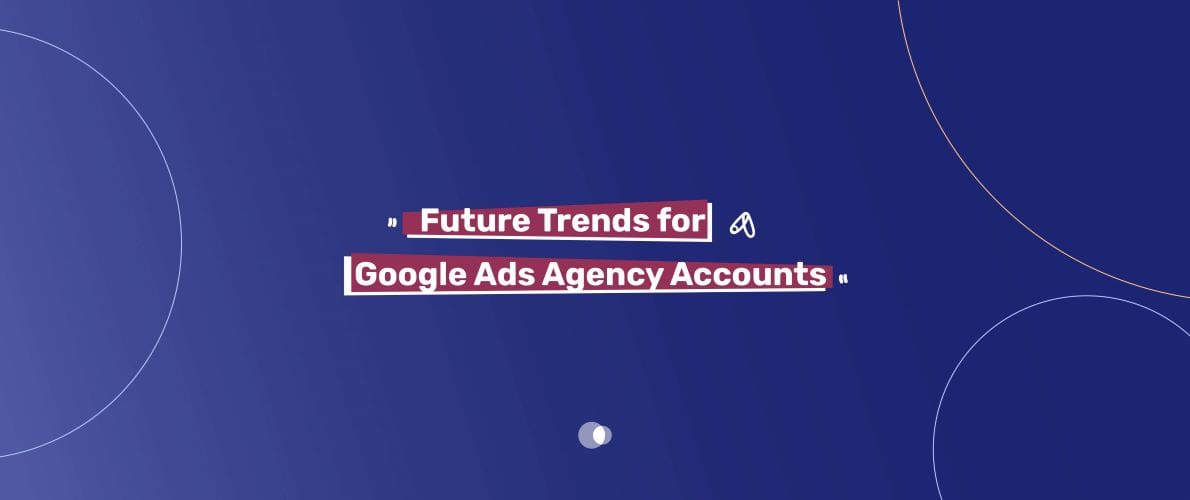The world of digital advertising is changing fast. Managing Google Ads agency accounts is getting a big update. Agencies need to keep up to offer the best strategies and solutions to their clients. This section looks at the trends that will shape Google Ads agency account management in the future.
Table of Contents

Key Takeaways
- The digital advertising landscape is rapidly evolving, requiring agencies to adapt their strategies and approaches.
- Emerging technologies, such as AI-powered automation and advanced bidding algorithms, are transforming the way campaigns are optimized and managed.
- Privacy-first advertising solutions and the integration of first-party data are becoming increasingly important for agencies to remain competitive.
- Mobile-first and video-centric campaigns are gaining prominence, necessitating agencies to develop specialized expertise in these areas.
- Google ads advertising agency in smart bidding and machine learning are enhancing the efficiency and effectiveness of agency campaigns.
The Evolution of Google Ads Management for Agencies
Digital marketing has changed a lot, and so has how agencies manage Google Ads. The old ways are gone, replaced by new, tech-based strategies. These changes meet the new client expectations and the evolving roles of account managers.
Traditional vs Modern Agency Management Approaches
Before, managing Google Ads was hard work. Account managers had to do everything by hand. They would tweak campaigns, adjust bids, and check results. This method worked well but is hard to keep up with today’s complex Google Ads and growing client needs.
Now, agency management evolution means using automation and artificial intelligence. Account managers use data and AI to make campaigns better. This lets them focus on big-picture decisions and making clients happy.
Key Changes in Client Expectations
- They want to see results in real-time and detailed reports.
- They expect advice based on data to improve their campaigns.
- They want to be part of the management process and see everything.
- They focus on results that matter to their business, not just numbers.
Shifting Role of Account Managers
The account manager role has changed a lot. Now, they are more about strategy than just doing tasks. They need to understand Google Ads well and use data to help businesses grow.
| Traditional Account Manager Roles | Modern Account Manager Roles |
| Campaign setup and optimizationReporting on key performance metricsReactive campaign adjustments | Strategic campaign planning and optimizationProactive performance analysis and recommendationsConsultative approach to client relationship management |
“The role of the account manager has evolved from a primarily operational function to a more strategic one, where they are expected to be data analysts, campaign strategists, and trusted advisors to their clients.”
AI-Powered Automation in Campaign Optimization
The world of Google Ads is changing fast, thanks to AI. Machine learning is making big changes in how agencies optimize campaigns. This leads to better efficiency and results.
AI automation is key to this change. It uses advanced algorithms to find patterns in huge amounts of data. This helps agencies save time on tasks like adjusting bids and creating ads. They can then focus on strategy and creativity.
The benefits of machine learning in advertising are huge. It makes campaigns better by adjusting bids and ads in real-time. This ensures every dollar is used to get the best results.
| Metric | Traditional Approach | AI-Powered Automation |
| Click-Through Rate | 12.5% | 17.2% |
| Conversion Rate | 3.8% | 5.6% |
| Cost per Acquisition | $42.50 | $35.20 |
As AI changes Google Ads, smart agencies are using it to get ahead. They use machine learning in advertising to optimize campaigns better. This leads to amazing results for their clients.
“The integration of AI-powered automation has been a game-changer for our SEM agency. We’re seeing significant improvements in campaign performance, and our clients are thrilled with the results.”
Trends for Google Ads Agency Accounts
Google Ads agencies are leading the way in digital advertising. They’re focusing on three main trends: Performance Max campaigns, cross-channel marketing, and advanced bidding strategies. These changes are shaping the future of how agencies manage their work.
Performance Max Campaign Dominance
Performance Max campaigns are taking over the Google Ads scene. They’re automated and work across many platforms like Search and YouTube. Agencies using them can improve their results and meet client goals better.
Cross-Channel Integration Strategies
Agencies are now using cross-channel marketing to connect with customers. They blend ads on Google Search, social media, and email. This creates a unified experience, boosting brand awareness and customer loyalty.
Advanced Bidding Technologies
Bidding strategies in Google Ads are getting smarter. Agencies use AI tools like Smart Bidding to fine-tune their ads. This helps them adjust to market changes and user behavior, making ads more effective.
Google Ads agencies that keep up with these trends will lead the way. They’ll offer top-notch solutions, helping clients achieve more and succeed in the long run.
Privacy-First Advertising Solutions
The digital world is changing fast, and data privacy is more important than ever. Advertisers need to adjust their plans to meet new privacy rules. This section looks at the trends and solutions changing how Google Ads campaigns are managed.
Embracing GDPR Compliance
The General Data Protection Regulation (GDPR) has changed the game for advertisers. They must now think differently about how they collect and use data. Agencies must make sure their Google Ads follow GDPR rules, using strong privacy measures and getting clear consent from users.
This move towards being more open and user-focused is key. It helps build trust with customers and keeps advertisers in line with the law.
Navigating the Cookieless Landscape
The end of third-party cookies is big news for advertisers. Agencies need to find new ways to target and measure ads, like using first-party data and contextual targeting. This way, they can keep their campaigns effective without using invasive tracking.
By keeping up with these changes, agencies can offer their clients new, privacy-focused ad strategies.
| Solution | Key Benefits | Challenges |
| First-Party Data Strategies | Improved data accuracy and relevanceEnhanced customer engagement and loyaltyCompliance with privacy regulations | Collecting and organizing first-party dataIntegrating data across multiple platformsEnsuring data quality and security |
| Contextual Targeting | Relevant ad placements without user trackingCompliance with privacy regulationsPotential for brand-safe advertising | Accurate content analysis and ad matchingScaling contextual targeting across campaignsBalancing relevance and user experience |
By adopting these data privacy and GDPR compliance strategies, agencies can lead in the world of cookieless advertising. They can run campaigns that are both effective and responsible, meeting the needs of clients and consumers.

Enhanced First-Party Data Integration
The digital world is changing fast, and first-party data is key in Rent Google ads agency account. Agencies use customer data platforms to make the most of their clients’ data. This helps them create ads that are more targeted and personal.
Customer Data Platform Implementation
Customer data platforms (CDPs) are changing the game for agencies. They help bring together and use clients’ first-party data. This gives a full picture of what customers like and want.
With this info, agencies can make ads that really speak to people. They can offer personalized experiences and connect better with their audience.
Audience Segmentation Techniques
Agencies use CDP insights to fine-tune their targeting. Audience segmentation lets them group people based on what they like and do. This makes ads more relevant and effective.
Being able to target better means agencies can spend their ad budget wisely. They can also improve how well ads work and build stronger relationships with customers.
Data Collection Methodologies
At the heart of these strategies is the need for ethical data collection. Agencies focus on privacy and getting consent before using data. This builds trust with clients and shows they’re responsible in the digital world.
By using first-party data well, agencies can make their campaigns better. They use customer data platforms and smart targeting to get great results for clients. As the industry grows, this approach will be even more important for agencies to keep up and offer real value.
Mobile-First Campaign Strategies
In today’s world, mobile devices are the main way we get information. So, making good mobile advertising campaigns is key for agencies. Google Ads now focuses on responsive ads and easy app promotion strategies.
Going mobile-first is now a must, not just a choice. Agencies need to make ads that work well on small screens. They must grab the attention of people who are always on the move. Responsive ad formats change size based on the device, making ads work on all screens.
- Use mobile-friendly ad designs that are simple, easy to read, and have a clear call-to-action.
- Use location-based targeting to find people near your clients’ businesses at the right time.
- Make sure your Google Ads campaigns include app promotion to get more app installs and keep users coming back.
By focusing on mobile first, agencies can lead the way. They can make campaigns that connect with today’s tech-smart audience and get real results for their clients.

“The future of advertising is mobile-first. Agencies that adapt to this reality will thrive in the years to come.”
Video Advertising Expansion
The world of digital marketing is changing fast, and video ads are leading the way. More people are watching videos online for fun and learning. This makes video ads a key tool for businesses to reach their audience. We’ll explore how agencies can use this to their advantage.
YouTube Ads Integration
YouTube is a top spot for YouTube advertising. Agencies need to know how to use YouTube ads well. They offer targeted ads, different formats, and detailed analytics. By using YouTube ads, agencies can tap into a huge audience and see real results.
Short-Form Video Opportunities
Short videos on TikTok and Instagram Reels are big now. Agencies should make short, catchy videos for these platforms. Using content from users and working with influencers can make these ads even more effective.
Connected TV Advertising
Connected TV (CTV) and streaming services are changing video ads. CTV ads let agencies target viewers in a new way. By understanding CTV, agencies can help their clients succeed in this new area.
| Video Advertising Tactic | Key Considerations | Potential Benefits |
| YouTube Ads Integration | Targeting capabilitiesAd format optimizationYouTube analytics and measurement | Access to a vast audienceIncreased brand visibilityMeasurable campaign performance |
| Short-Form Video Opportunities | Content creation strategiesInfluencer partnershipsUser-generated content integration | Engaging and attention-grabbing adsLeveraging viral potentialCost-effective content production |
| Connected TV Advertising | Audience targeting and segmentationAd format and placement optimizationMeasurement and attribution | Personalized ad experiencesIncreased viewer engagementMeasurable return on investment |
“The future of advertising is in the hands of those who can create compelling, personalized video content that resonates with their target audience.”
As digital marketing keeps changing, agencies that use video ads, YouTube advertising, and CTV ads will lead the way. They’ll deliver great results for their clients and stay ahead of the game.
Smart Bidding and Machine Learning Advancements
The world of digital advertising has changed a lot. This is thanks to smart bidding and machine learning. These new tools help agencies manage and improve their campaigns better.
At the heart of this change is smart bidding in Google Ads. It uses machine learning to look at lots of data. Then, it makes quick decisions to help meet campaign goals.
| Traditional Bidding | Smart Bidding |
| Manual, time-consuming process | Automated, data-driven optimization |
| Limited optimization capabilities | Sophisticated, real-time adjustments |
| Lack of flexibility to changing market conditions | Adaptable to shifting user behavior and trends |
Using automated bidding lets agencies save time. They can then focus on planning and creativity. With machine learning in PPC, they can predict what users will do. This helps them make their ads more effective.
“The integration of smart bidding and machine learning has revolutionized the way we approach Google Ads management. It’s not just about setting a bid and hoping for the best – it’s about leveraging data-driven insights to make informed, strategic decisions that drive tangible results for our clients.”
As digital ads keep changing, it’s key to stay up-to-date. Agencies that use these smart bidding and machine learning tools will do well. They’ll offer great value to their clients.
Local Service Ads and Maps Integration
The digital world is changing fast. Now, using Local Service Ads and Google Maps is key for businesses to reach local customers. This part talks about new ways agencies use to make their clients more visible on these important platforms.
Geographic Targeting Innovations
Agencies are using smart ways to target ads to the right local people. They use detailed location data and smart analytics to find and talk to potential customers in a specific area. This makes ads more relevant and helps local businesses get more customers.
Local Inventory Promotion
Agencies also use Local Service Ads and Google Maps to show off what’s available locally. They make sure people know what’s nearby. This makes shopping easier and can bring more people into stores and increase sales.
Service Area Business Optimization
For businesses that serve a specific area, agencies use Local Service Ads and Google Maps to improve their online look. They map out where they serve, make business profiles better, and use location features. This helps businesses show up more in local searches and get more good leads.
FAQ
1)What are the key changes in client expectations for Google Ads agency management?
Clients now want more transparency and data-driven insights. They expect their Google Ads agencies to keep up with new trends and technologies. This ensures better campaign performance.
2)How is the role of the account manager evolving in the modern Google Ads agency landscape?
Account managers are now strategic consultants, not just order-takers. They use data and analytics to give actionable advice. They also need to understand new technologies and their impact on ads.
3)What is the role of AI-powered automation in optimizing Google Ads campaigns?
AI and machine learning are changing how campaigns are optimized. They automate tasks like bid adjustments and audience targeting. This makes campaigns more efficient and allows for more strategic planning.
4)How is the rise of Performance Max campaigns impacting Google Ads agency accounts?
Performance Max campaigns are becoming more popular. They use machine learning to optimize ads across Google’s inventory. Agencies must adapt to use this new campaign type effectively.
5)What are the key trends in cross-channel integration for Google Ads agency accounts?
Agencies are focusing on integrating Google Ads with other digital channels. This includes social media, email, and display ads. It helps target audiences better and personalize ads.
6)How are privacy-first advertising solutions impacting Google Ads agency strategies?
Agencies are moving to privacy-first solutions due to data privacy concerns. They’re focusing on first-party data collection and complying with regulations like GDPR. This ensures ads are more secure.
7)What are the key considerations for mobile-first campaign strategies in Google Ads?
Agencies must create ads that work well on mobile devices. They should use responsive ad formats and understand mobile user behaviors. Promoting apps and in-app ads is also key.
8)How are advancements in smart bidding and machine learning impacting Google Ads agency management?
Smart bidding and machine learning are improving campaign performance. Agencies must stay updated on these technologies. This helps them optimize campaigns better.
9)What are the key opportunities for integrating Local Service Ads and Google Maps into advertising strategies?
Using Local Service Ads and Google Maps can target local consumers. It promotes local services and inventory. This makes ads more relevant and personalized.



